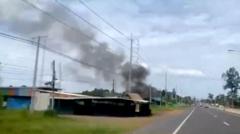Despite their geographic closeness and shared cultural heritage, Thailand and Cambodia have found themselves embroiled in a severe military conflict that reignited last month and escalated dramatically in recent days. The border disputes, deeply rooted in history, have led to the deaths of at least 12 Thai nationals, predominantly civilians, as both nations exchanged accusations regarding the origins of the violence.
The confrontation that became fatal on Thursday had its roots well before 2008, when Cambodia attempted to claim a historical temple as a UNESCO World Heritage site, sparking outrage in Thailand. The already fractious relationship eroded further in May when a Cambodian soldier died in skirmishes, plunging diplomatic ties into turmoil.
On Thursday morning, Thailand's National Security Council reported that Cambodian military forces deployed drones for surveillance while armed personnel prepared for conflict. According to their account, Cambodian soldiers opened fire first, compelling a retaliatory response from Thailand, including air strikes targeting military positions in Cambodia.
However, officials in Cambodia asserted that the Thai military was the aggressor, asserting they violated prior agreements by approaching a sacred temple. They claimed their troops acted only in defense when engaged by Thai forces.
While both nations attempt to maintain their justifications, the consequences of the clashes have been palpable. Thailand’s acting prime minister characterized the situation as tenuous, emphasizing the need for a lawful resolution, while Cambodia's leadership expressed a desire for a peaceful resolution but made it clear they will employ necessary measures to protect their sovereignty.
With the hostilities localized, travel advisories have been cautious, recommending travelers in the vicinity remain vigilant. In contrast, China has urged its citizens in Cambodia to avoid the border area altogether.
As calls for diplomacy continue amid escalating military maneuvers, the international community watches closely, wary of the potential for further conflict between the neighboring nations in Southeast Asia.
The confrontation that became fatal on Thursday had its roots well before 2008, when Cambodia attempted to claim a historical temple as a UNESCO World Heritage site, sparking outrage in Thailand. The already fractious relationship eroded further in May when a Cambodian soldier died in skirmishes, plunging diplomatic ties into turmoil.
On Thursday morning, Thailand's National Security Council reported that Cambodian military forces deployed drones for surveillance while armed personnel prepared for conflict. According to their account, Cambodian soldiers opened fire first, compelling a retaliatory response from Thailand, including air strikes targeting military positions in Cambodia.
However, officials in Cambodia asserted that the Thai military was the aggressor, asserting they violated prior agreements by approaching a sacred temple. They claimed their troops acted only in defense when engaged by Thai forces.
While both nations attempt to maintain their justifications, the consequences of the clashes have been palpable. Thailand’s acting prime minister characterized the situation as tenuous, emphasizing the need for a lawful resolution, while Cambodia's leadership expressed a desire for a peaceful resolution but made it clear they will employ necessary measures to protect their sovereignty.
With the hostilities localized, travel advisories have been cautious, recommending travelers in the vicinity remain vigilant. In contrast, China has urged its citizens in Cambodia to avoid the border area altogether.
As calls for diplomacy continue amid escalating military maneuvers, the international community watches closely, wary of the potential for further conflict between the neighboring nations in Southeast Asia.





















